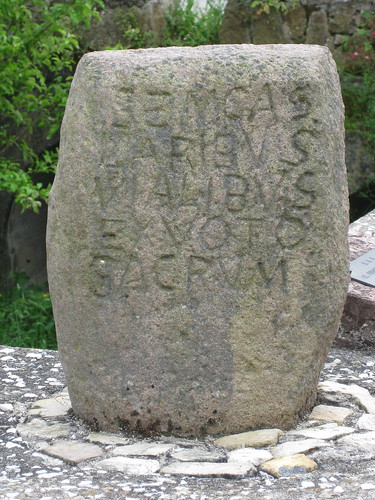Actually, I found a monograph titled "Within the Confines of the Romano-Celtic World: The Gods of the Roads" by Francisco Marco Simón in which he says that this is one of 2 such inscriptions in Asturias, of 40-odd found throughout Celtic regions of the former Roman empire. He cites it as an example of how Celts reshaped foreign Roman ideas of religion to suit their own spiritual needs. He records the inscription as "Sem(pronius) Cas(sius) / Laribus / Vialibus / ex voto / sacrum." The Lares Viales were gods of the highways and byways, the deities who protected travelers. Evidently, they were particularly popular in Celtic lands. Simón writes:
In the north-west of the Iberian Peninsula, in the province of Hispania Citerior, Latin epigraphs document the establishment of the worship of certain deities, the Lares
Viales, with very few mentions in the rest of the Empire, and this has led various authors to suggest that these Latin theonyms were really referring to indigenous deities traditionally venerated in the areas in which these inscriptions appeared...
Thus, the Lares Viales are documented in the north-west of the Peninsula, with most of the occurrences in the conventus Lucensis and, to a lesser extent, in the Bracaraugustanus and the Asturum. As well as the thirty-odd epigraphs found in the north-west, the Lares Viales are also found on altars in other zones of Hispania Citerior corresponding to a substratum which might be considered Hispano-Celtic...
These authors have stated that the worship of the Lares, introduced by the Flavii in these barely Romanized north-western areas which steadfastly held on to their Celtic traditions, “smothered the Celtic religion as it was, and its barbaric nature disappeared under the cloak of the Lares” (1969, 231). This would have been an ambiguous process, since “it was especially in the provinces and among their inhabitants that the concept of Lares or Penates, a precise concept in Roman thinking, took on, accompanied by the epithet patrii, its broadest, vaguest meaning, that of a protective deity...."

